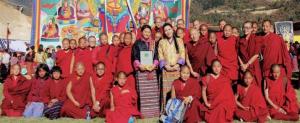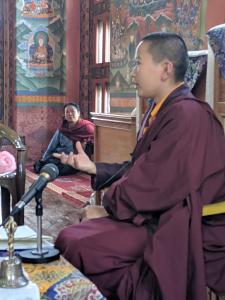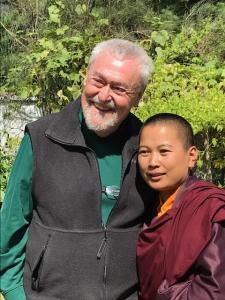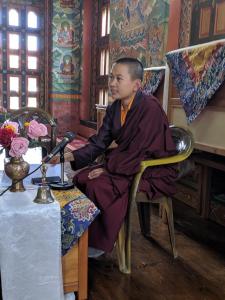This was the last day of the retreat part of our journey to Bhutan, and the second last of our days in this wondrous tiny Buddhist kingdom nestled into the Himalayas.
One of the three of us who are Zen practitioners have talked about the word “retreat” for our experience. Frankly, there is little connection to our understanding of that term and what we’ve been going through together. But one of us noted, well, if retreat is a container, a Zen retreat is a pressure cooker. She paused. And, this is a colander. What a lovely image! And a perfect description of our time together, which was long on talks (including from me) which were called “teachings,” and short on meditation. I have to admit, nonetheless through the wave after wave of Buddhist encounter, especially Buddhism as I’ve never experienced it, I’ve been well rinsed and shaken…
This shaking and and rising proved nowhere more true than this last day…
The program began with David speaking. However, while he was presenting a small party arrived. When he was done and we were ready for a break, we were introduced to the nun Namgyel Lhamo and her party from the Bhutan Nuns Foundation. (Not to be confused as I later learned when researching this remarkable woman, with the singer of the same name, also known as the Nightingale of Tibet.)
We, by we I mean Marla and Charles from Two Truths, had been in contact with the foundation, hoping to get the Venerable Lhamo to speak. She had been in the eastern part of the country and had other speaking obligations, and the deal had to be if she could, when she could, she would arrive, and we would accommodate her. And she had. So, of course, I happily gave up the teacher’s seat to her.
Ani Namgyel Lhamo looked very young. She also looked very in charge.
Her English was quite good, although heavily accented. All that meant was we had to listen. I quickly realized I was in the presence of someone remarkable.

She was charged with two things. One of which was to give a dharma talk. And, the other was to speak about the work of the foundation, and she did both.
First the foundation. She spoke of the conditions for the nun’s sangha in Bhutan up until fairly recently. And how things are changing dramatically in significant part due to the work of the foundation. She spoke admiringly of her boss Dr Tashi Zangmo, who with the support and equal vision of the Queen Mother, has driven a full on reformation for nuns within the kingdom.
Later I looked Dr Zangmo up. Born in 1963 in a small village, she became the first girl from there to get to a college. In her case attending Mount Holyoke and then earning a doctorate form the University of Massachusetts in Amherst. She also earned a Bhuddology degree from the Central Institute of Higher Tibetan Studies in Varanasi. In 2009 Dr Zangmo and the Queen Mother created the Bhutan Nuns Foundation, which she has served as executive director ever since. Maybe incidentally, but I think not, Dr Zangmo has been named one of the 100 most influential women in the world by the BBC)
Back to our visit.
Venerable Namgyel Lhamo had a frank and disarming style. You could see why she is a close lieutenant for Dr Zangmo. She described the horrific condition for nuns before the foundation began its work. Many undoubtedly holy. But also uneducated, often malnourished, and generally ignored. In less than a decade the conditions for nuns have improved dramatically. Although it is still, like the country, very much a work in progress
(The whole kingdom’s advances have been made in rapid order as it has leapt in less than a century from an absolute feudal monarchy to a flawed – I don’t mean to ignore the very real problems, the worst of which is described at that link – and now full on constitutional monarchy with a vision for itself that has captured the world’s imagination.)
The foundation’s vision is to support the dharma and specifically the conditions with which it can be taught and practiced by nuns. This is as basic as building “or refurbishing sleeping quarters, bathrooms, kitchens, libraries and classrooms.” But it doesn’t stop there. As they describe themselves, “Leveraging economies of scale, a nationwide nunnery education program will be implemented. A key aspect of the program will be providing adult literacy and practical, self-sufficiency skills training. Teachers, preferably nuns, will be trained, initially in India, then at a BNF training facility. Supplies, books and other learning materials will be provided. The BNF will establish partnerships with NGO’s, government agencies and other groups. An association/network of nunneries will be established to share best practices and provide mutual support.”

Although the “will” in that vision statement is now a full on “are.”
She described improving access to decent and adequate food, repairing sleeping quarters, and providing educational opportunities. As an example of how basic some of the work is, she described teaching nuns about menstruation. I know I was and I believe we were all profoundly moved at the matter of fact way she addressed this and other issues. Later I found a story that she alluded to in passing that spoke about receiving a grant of six thousand dollars, with which they were able to support three teachers for convent schools. Small money does big things in this country.
I would say I was in equal parts impressed by the work of the foundation and their spokesperson. She only spoke a little of her personal background. But I found a delightful if all to brief memoir at Buddhist Door.
She realized she wanted to be a nun at the age of five. At fourteen with the reluctant support of her family she joined the Bhutanese Nyingmapa order. She was ordained by Khenchen Thubten Odser, founder of the Ngodup Charbabling Nunnery in Nepal. From there she went to the Central Institute for Tibetan Studies in Sarnath., where in 2013 she received her master’s degree and the title acharya. While at the school she heard of Dr Zangmo and the work of the foundation. It was a perfect meeting. And with her degree in hand she began working for the foundation.
As she writes in the memoir, “My work involves creating different types of training programs needed by the nuns and attending various meetings to share and discuss issues of concern to nuns—their stories, and their dreams of what they can contribute to society. In addition, I visit nunneries across the country to learn about the difficulties they experience and the realities of their living situations. By working with the BNF, I am able to advocate and promote the importance of education for nuns and to encourage our nuns to undertake both traditional and modern education, both of which are needed in the 21st century.”
Equally important was her dharma talk. She confessed this was her first official charge to “give a teaching.” An important step in the life of a spiritual leader. And I’m honored we were the recipients of her wisdom. She moved gracefully into a discussion of Tara, and the practices central to her devotion, certainly opening doors to me regarding the deity and along with that many aspects of a woman’s insight into the Vajrayana. And with that the whole of the Buddhadharma. Along the way she asserted how glad she was to be a woman practicing the dharma and thought the idea of doing one’s practice in order to be reborn as a man, as is commonly done in some Buddhist circles, is silly.
She wove a path for all of us.

And then she took questions. She addressed one of our number’s interest in dakinis. And in response to another query, she gave us a simple, clear, and compassionate teaching about the practice of tonglen.
Then one of us, okay it was me, asked if she could bless some malas. She replied that nuns are not normally asked to bless things. Others joined and we requested she do. One thing about Namgyel Lhamo is that she is not easily shaken. She said okay there’s a blessing, and she consulted some notes, and after we placed our malas and other objects we wished blessed by her on the small table in front of her, she blessed them, and then threw in a blessing for us all. Maybe a first. I doubt a last.
Similarly, one of us asked about titles. She was simply addressed as ani, which means aunt and is a term simply meaning nun. But we noted she seemed to be of the same rank as several of the male teachers we’d witnessed. It turns out all the major teaching titles are masculine. Who would have thought? It was noted her academic title is a venerable title in Buddhism, Acharya. And we started addressing her as such.
Marla and Charles gave her a small offering on our behalf, she and her party stayed for lunch, and graciously allowed us to take pictures with her.
Let me say. Of a number of high points on this adventure, none exceeded this one.
What an honor. What an honor.
I suspect not only will we be hearing more from the nuns of Bhutan. Among them it certainly seems to me, are keepers of the secrets of our hearts. But also more from one particular nun among them…
Later I did speak a little. Then there was a closing ceremony. And kind of an extra closing after that. Then a lovely traditional dinner at a restaurant that is housed in a restored farmhouse.
And finally to bed…
Oh. One more thing. Want to help? Here’s a very good way to do so.













